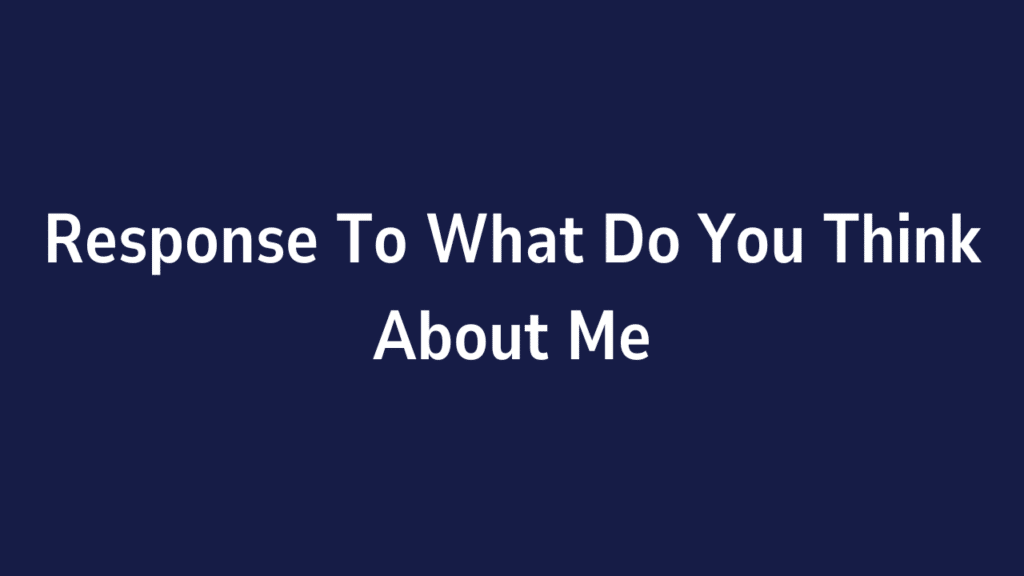The question, “What do you think about me?” can catch anyone off guard. Whether it comes from a friend, family member, colleague, or romantic interest, your response carries weight. This question invites honesty, but it also requires sensitivity and tact.
In this blog post, we’ll explore different ways to respond to “What do you think about me?” depending on the context and your relationship with the person. We’ll provide practical examples, tips, and even a table summarizing key responses for easy reference.
1. Why Do People Ask “What Do You Think About Me?”
Understanding the intent behind this question is essential. People may ask for various reasons:
- Seeking Validation: They might want reassurance about their qualities or actions.
- Building Connection: They may genuinely want to know how you perceive them to strengthen your relationship.
- Personal Growth: Some people ask to gain constructive feedback and improve themselves.
- Romantic Interest: If someone has feelings for you, they might ask this question to gauge your interest.
The reason behind the question will guide how you frame your response.
2. General Tips for Responding
Here are some key points to keep in mind when answering:
- Be Honest: Provide a truthful answer that aligns with your feelings.
- Be Kind: Even if you have constructive feedback, deliver it gently.
- Be Thoughtful: Take a moment to consider your response before speaking.
- Consider the Context: Tailor your answer to the situation and your relationship with the person.
3. How to Respond Based on the Context
3.1 If Asked by a Friend
Friends often ask this question to strengthen your bond or seek reassurance. Keep your response positive and supportive.
- “I think you’re a great friend. You’re always there when I need you.”
- “You’re kind, funny, and someone I can always count on.”
- “I appreciate how honest and supportive you are.”
If you need to give constructive feedback, balance it with positivity:
- “You’re an amazing friend, but sometimes I feel like you don’t give yourself enough credit.”
- “I really value our friendship, and I think you could work on being more patient with yourself.”
3.2 If Asked by a Romantic Partner
When your partner asks this question, they might be looking for validation or deeper connection. Be genuine and affirm their importance to you:
- “I think you’re amazing. You make me feel loved and supported every day.”
- “You’re my favorite person. I love how kind and thoughtful you are.”
- “I admire your strength and how you always strive to be your best.”
If there’s an issue you need to address, approach it gently:
- “I love how caring you are, but I feel like we could communicate more openly sometimes.”
3.3 If Asked by a Colleague
In a professional setting, focus on the person’s skills and work ethic:
- “I think you’re a hardworking and reliable team member.”
- “I really admire your creativity and problem-solving skills.”
- “You’re someone who brings positive energy to the team.”
If you’re asked for constructive feedback, frame it constructively:
- “You’re great at meeting deadlines, but I think you could delegate tasks more effectively.”
3.4 If Asked by an Acquaintance
When someone you don’t know well asks, keep your response polite and neutral:
- “You seem like a kind and thoughtful person.”
- “I think you’re friendly and easy to talk to.”
- “You give off a great energy, and I’d love to get to know you better.”
4. Dealing with Tricky Situations
Sometimes, responding to this question can be challenging. Here’s how to handle specific scenarios:
4.1 If You Don’t Have a Clear Opinion
- “I think you’re great, but I’d love to spend more time with you to get to know you better.”
- “I don’t know you very well yet, but I get a good vibe from you.”
4.2 If You Need to Be Honest About Negative Feedback
Frame your response with kindness and balance:
- “I think you’re very talented, but sometimes your tone can come across as harsh.”
- “I really admire your determination, but I think we could work on communicating better.”
4.3 If You Feel Pressured to Answer
Take a moment to think before replying:
- “That’s a deep question! Let me think about how to best answer it.”
- “I want to give you a thoughtful answer. Can we revisit this later?”
5. How to Respond Based on the Person’s Intent
It’s important to tailor your response to the reason behind the question. Here are some possible intents and corresponding responses:
| Intent | Example Response |
|---|---|
| Validation | “I think you’re amazing and always fun to be around.” |
| Building connection | “I really admire your passion and dedication.” |
| Personal growth | “You’re doing great, but I think you could focus more on [area].” |
| Romantic interest | “I think you’re incredible, and I really enjoy spending time with you.” |
6. Using Humor to Respond
If the situation is lighthearted, you can use humor to keep the tone fun:
- “What do I think about you? You’re okay, I guess. Just kidding—you’re awesome!”
- “I think you’re the best person in this room. Of course, we’re the only two here!”
- “Well, you’re not perfect, but you’re pretty close!”
Humor works well if you have a casual relationship with the person and know they’ll appreciate it.
7. Balancing Honesty with Kindness
Honesty is important, but how you deliver your answer matters. Use these tips to balance your response:
- Start with a Positive: Begin with a compliment or acknowledgment of their strengths.
- Be Specific: Mention particular traits or actions you admire.
- Offer Constructive Feedback (If Needed): Frame it as an opportunity for growth rather than criticism.
8. Examples for Different Relationships
Here’s a quick-reference table with example responses based on the type of relationship:
| Relationship | Example Response |
|---|---|
| Friend | “I think you’re an amazing friend—fun, loyal, and caring.” |
| Romantic Partner | “I think you’re the most supportive and loving person I’ve ever met.” |
| Colleague | “I really respect your work ethic and attention to detail.” |
| Acquaintance | “You seem like a kind and approachable person.” |
| Family Member | “I think you’re incredibly supportive and always there for me.” |
9. What to Avoid When Answering
While crafting your response, keep these points in mind:
- Avoid Being Too Critical: Even if you have constructive feedback, avoid being overly harsh.
- Don’t Overthink It: Sometimes, a simple, heartfelt answer is better than overanalyzing.
- Don’t Lie: Be genuine in your response to maintain trust.
10. Conclusion
Responding to “What do you think about me?” is an opportunity to show thoughtfulness, kindness, and honesty. Whether it’s a friend, partner, colleague, or acquaintance asking, tailor your response to the context and your relationship.
Remember, this question often reflects the other person’s desire for connection or self-awareness. By answering sincerely and positively, you can deepen your bond and make the conversation meaningful.
So, the next time someone asks, “What do you think about me?” you’ll be ready with a thoughtful and impactful response.



